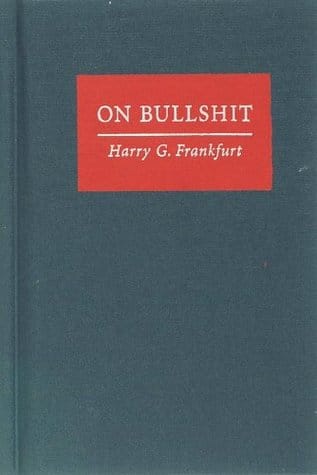읽어보며 번역해본다.
One of the most salient features of our culture is that there is so much bullshit. Everyone knows this. Each of us contributes his share. But we tend to take the situation for granted. Most people are rather confident of their ability to recognize bullshit and to avoid being taken in by it. So the phenomenon has not aroused much deliberate concern, nor attracted much sustained inquiry.
우리 문화의 가장 두드러진 특징 중 하나는 개소리가 아주 많다는 점이다. 이 사실은 모두가 알고 있다. 우리 각자도 자기 몫의 개소리를 보태며 살아간다. 하지만 우리는 이런 상황을 대체로 당연하게 여긴다. 대부분의 사람들은 개소리를 알아보고 속지 않을 자신이 있다고 생각한다. 그래서 이 현상에 대해 의도적으로 걱정하거나, 꾸준히 깊이 있게 탐구하는 일은 거의 없다.
In consequence, we have no clear understanding of what bullshit is, why there is so much of it, or what functions it serves. And we lack a conscientiously developed appreciation of what it means to us. In other words, we have no theory. I propose to begin the development of a theoretical understanding of bullshit, mainly by providing some tentative and exploratory philosophical analysis. I shall not consider the rhetorical uses and misuses of bullshit. My aim is simply to give a rough account of what bullshit is and how it differs from what it is not—or (putting it somewhat differently) to articulate, more or less sketchily, the structure of its concept.
그 결과 우리는 개소리가 정확히 무엇인지, 왜 이렇게 많은지, 어떤 기능을 하는지에 대해 명확하게 이해하지 못한다. 그리고 개소리가 우리에게 어떤 의미가 있는지를 성실하게 성찰해본 경험도 부족하다. 다시 말해, 우리는 이 현상에 대한 이론이 없다. 나는 이 글에서 개소리에 대한 이론적 이해를 개발하기 위한 출발점으로, 일단 잠정적이고 탐색적인 철학적 분석을 시도하려 한다. 여기서는 개소리의 수사적 용법이나 오용에 대해서는 다루지 않겠다. 내 목적은 개소리가 무엇이고, 그것이 아닌 것과 어떻게 구분되는지—혹은 달리 말해, 그 개념의 구조를 대략적으로 밝히려는 데 있다.
Any suggestion about what conditions are logically both necessary and sufficient for the constitution of bullshit is bound to be somewhat arbitrary. For one thing, the expression bullshit is often employed quite loosely—simply as a generic term abuse, with no very specific literal meaning. For another, the phenomenon itself is so vast and amorphous that no crisp and perspicuous analysis of its concept can avoid being procrustean. Nonetheless it should be possible to say something helpful, even though it is not likely to be decisive. Even the most basic and preliminary questions about bullshit remain, after all, not only unanswered but unasked.
개소리를 구성하는 조건이 논리적으로 필요충분한 것이라고 제시하려는 어떤 시도도 다소 임의적일 수밖에 없다. 우선 개소리라는 표현 자체가 흔히 아주 느슨하게 사용되며—구체적인 의미 없이 그냥 욕설이나 일반적 비난의 용어로 쓰인다. 또 이 현상 자체가 거대하고 형태가 모호하기 때문에, 그 개념에 대한 명확하고 통찰력 있는 분석조차 결국은 억지로 끼워 맞춘 결과가 되기 쉽다. 그럼에도 불구하고, 결정적인 결론은 아닐지라도 유의미한 논의를 펼칠 수는 있을 것이다. 사실 개소리와 관련한 가장 기본적이고 예비적인 질문조차 아직은 답이 없는 것은 물론, 제대로 제기된 적도 없다.
So far as I am aware, very little work has been done on this subject. I have not undertaken a survey of the literature, partly because I do not know how to go about it. To be sure, there is one quite obvious place to look—the Oxford English Dictionary. The OED has an entry for bullshit in the supplementary volumes, and it also has entries for various pertinent uses of the word bull and for some related terms. I shall consider some of these entries in due course. I have not consulted dictionaries in languages other than English, because I do not know the words for bullshit or bull in any other language.
내가 알기로 이 주제에 대해 연구된 바는 거의 없다. 자료 조사를 해본 것도 아닌데, 그 이유 중 하나는 어디서부터 어떻게 시작해야 할지 잘 모르기 때문이다. 물론 살펴볼 만한 가장 뚜렷한 자료는 있다. 바로 옥스퍼드 영어 사전이다. 부록권에는 개소리(bullshit)에 대한 항목이 있고, bull이라는 단어의 다양한 용법과 그와 연관된 몇몇 단어에 대한 항목도 있다. 나는 적절한 시점에 이들 항목 중 일부를 다뤄볼 생각이다. 영어 이외의 다른 언어 사전은 참고하지 않았다. 다른 언어에서는 개소리나 bull에 해당하는 단어가 무엇인지 모르기 때문이다.
Another worthwhile source is the title essay in The Prevalence of Humbug by Max Black*. I am uncertain just how close the meaning the word humbug is to the word bullshit. Of course, the words are not freely and fully interchangeable; it is clear that they are used differently. But the difference appears on the whole to have more to do with considerations of gentility, and certain other rhetorical parameters, than with the strictly literal modes of significance that concern me most. It is more polite, as well as less intense, to say "Humbug!" than to say "Bullshit!" For the sake of this discussion, I shall assume that there is no other important difference between the two.
*Max Black, The prevalence of Humbug (Ithaca: Cornell University Press, 1985).
또 하나 참고할 만한 자료는 맥스 블랙*의 『허풍의 만연(The Prevalence of Humbug)』에 실린 표제 에세이다. humbug라는 단어의 의미가 bullshit과 얼마나 가까운지는 확실치 않다. 물론 이 두 단어는 자유롭게 완전히 바꿔 쓸 수는 없으니, 서로 다르게 사용된다는 점은 분명하다. 그러나 이 차이는 대체로 나의 주 관심사인 엄밀한 문자적 의미보다는, 예절적 고려나 몇몇 수사적 요소에 더 관련이 있어 보인다. '허풍(humbug)'이라고 말하는 것이 '개소리(bullshit)'라고 하는 것보다 더 정중하고, 강도도 덜하다. 여기서는 두 단어 사이에 다른 본질적 차이가 없다고 가정하고 논의를 이어가겠다.
*맥스 블랙, 『허풍의 만연(The Prevalence of Humbug)』(아이타카: 코넬 대학교 출판부, 1985).
Black suggests a number of synonyms for humbug, including the following: balderdash, claptrap, hokum, drivel, buncombe, imposture, and quackery. This list of quaint equivalents is not very helpful. But Black also confronts the problem of establishing the nature of humbug more directly, and he offers the following formal definition:
HUMBUG: deceptive misrepresentation, short of lying, especially by pretentious word or deed, of somebody's own thoughts, feelings, or attitudes.
A very similar formulation might plausibly be offered as enunciating the essential characteristics of bullshit. As a preliminary to developing an independent account of those characteristics, I will comment on the various elements of Blacks's definition.
Deceptive misrepresentation: This may sound pleonastic. No doubt what Black has in mind is that humbug is necessarily designed or intended to deceive, that its misrepresentation is not merely inadvertent. In other words, it is deliberate misrepresentation. Now if, as a matter of conceptual necessity, an intention to deceive is an invariable feature of humbug, then the property of being humbug depends at least in part upon the perpetrator's state of mind. It cannot be identical, accordingly, with any properties—either inherent or relational—belonging just to the utterance by which the humbug is perpetrated. In this respect, the property of being humbug is similar to that of being a lie, which is identical neither with the falsity nor with any of the other properties of the statement the liar makes, but which requires that the liar makes his statement in a certain state of mind—namely, with an intention to deceive.
HUMBUG: 거짓말에까지 이르지는 않지만, 특히 거드름을 피우는(과장된) 말이나 행동으로 자신의 생각, 감정, 태도를 속이려 하는 기만적인 잘못된 표현.
이와 거의 같은 방식으로 bullshit(개소리)의 본질적 특성을 설명할 수도 있을 것이다. 이러한 특성에 대한 독립적인 설명을 제시하기에 앞서, 나는 Black의 정의 내 여러 요소에 대해 먼저 논평하고자 한다.
기만적인(속이려는) 잘못된 표현: 이는 중복적으로 들릴 수 있다. 아마(분명히) Black이 의도한 것은 humbug란 반드시 속이기 위해 설계되거나 의도된 것이고, 그런 잘못된 표현은 단지 실수로 나온 것이 아니라는 점이다. 즉, 이는 고의적인 잘못된 표현이다. 만약 개념적으로 속이려는 의도가 humbug의 필수 불가결한 성질이라면, humbug의 성질은 적어도 부분적으로 행위자의 심리 상태에 달려 있게 된다. 따라서 humbug의 성질은 그것이 행해지는 발화 행위가 지닌 고유한 속성, 즉 내재적이거나 관계적인 어떤 성질들과 동일할 수 없다. 이런 점에서, humbug의 성질은 거짓말의 성질과 비슷하다. 거짓말의 성질 역시 단순히 진술의 거짓됨이나 진술이 가진 다른 속성과 동일하지 않으며, 거짓말은 반드시 거짓말하는 사람이 특정 심리 상태―즉, 속이려는 의도―를 가지고 진술해야만 한다.






